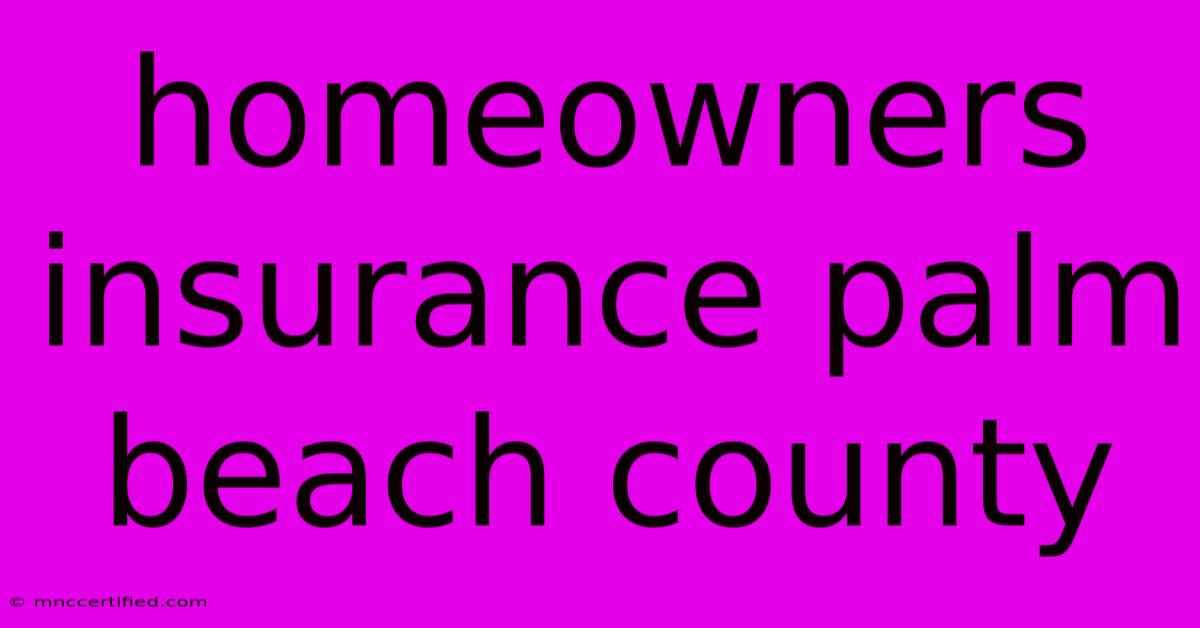Homeowners Insurance Palm Beach County

Table of Contents
Navigating Homeowners Insurance in Palm Beach County: What You Need to Know
Palm Beach County boasts beautiful beaches, luxurious living, and a vibrant community. But with this comes the challenge of protecting your valuable property from potential risks. Homeowners insurance is crucial for safeguarding your investment and peace of mind in this unique environment. This guide will delve into the intricacies of homeowners insurance in Palm Beach County, equipping you with the knowledge to make informed decisions.
Understanding the Risks in Palm Beach County
Palm Beach County faces specific challenges that influence homeowners insurance premiums:
- Hurricane Season: The Atlantic hurricane season runs from June 1st to November 30th, posing a significant threat to homes. Coastal properties are especially vulnerable to wind damage, flooding, and storm surge.
- Coastal Erosion: Sea level rise and coastal erosion impact beachfront properties, increasing the risk of damage.
- Tropical Storms & Heavy Rainfall: While not as powerful as hurricanes, tropical storms can still cause significant flooding and water damage.
- High Property Values: Palm Beach County is known for its high-end properties, which can lead to higher premiums.
Key Coverage Components:
Homeowners insurance policies typically cover these key areas:
- Dwelling Coverage: Protects your home's structure from damage caused by covered perils like fire, windstorms, and theft.
- Personal Property Coverage: Insures your belongings inside your home, such as furniture, electronics, and clothing.
- Liability Coverage: Protects you from lawsuits if someone is injured on your property.
- Additional Living Expenses (ALE): Covers temporary housing and other expenses if your home becomes uninhabitable due to a covered event.
Factors Affecting Your Premium:
Several factors determine your homeowners insurance premium in Palm Beach County:
- Location: Coastal properties generally pay higher premiums due to hurricane risk.
- Home Age and Construction: Older homes or those with unique materials may have higher premiums.
- Credit Score: A good credit score can lead to lower premiums.
- Deductible: A higher deductible means lower premiums, but you'll pay more out of pocket for claims.
- Coverage Amount: The higher your coverage amount, the more you'll pay for premiums.
- Flood Coverage: Separate flood insurance is often necessary, especially for homes in flood zones.
Finding the Right Insurance Provider:
Tips for choosing the right homeowners insurance provider in Palm Beach County:
- Research & Compare: Get quotes from several reputable insurers to compare coverage and pricing.
- Consider Local Expertise: Look for insurers with extensive experience handling claims in Palm Beach County.
- Understand Your Needs: Analyze your home's specific risks and coverage requirements.
- Read Reviews & Testimonials: Check online reviews and customer feedback to gauge an insurer's reputation.
Protecting Yourself:
- Mitigate Risks: Take steps to reduce your risk of damage, such as installing hurricane shutters or reinforcing your roof.
- Consider Flood Insurance: If your property is in a flood zone, flood insurance is highly recommended.
- Review Your Policy Regularly: Update your policy to reflect any changes in your home's value or belongings.
Conclusion:
Navigating homeowners insurance in Palm Beach County requires careful consideration. By understanding the unique risks and coverage options, you can make informed decisions to protect your home and peace of mind. Remember to thoroughly research and compare options, and choose a reputable insurer that aligns with your specific needs.

Thank you for visiting our website wich cover about Homeowners Insurance Palm Beach County. We hope the information provided has been useful to you. Feel free to contact us if you have any questions or need further assistance. See you next time and dont miss to bookmark.
Featured Posts
-
Life Insurance Calculator South Africa
Nov 09, 2024
-
Aldi Cheese Recall What To Do If You Bought It
Nov 09, 2024
-
Shelter Insurance Greeneville Tennessee
Nov 09, 2024
-
Iowa Vs Ucla Leistikows Time Factor Analysis
Nov 09, 2024
-
Which Dividend Option Would An Insurer
Nov 09, 2024